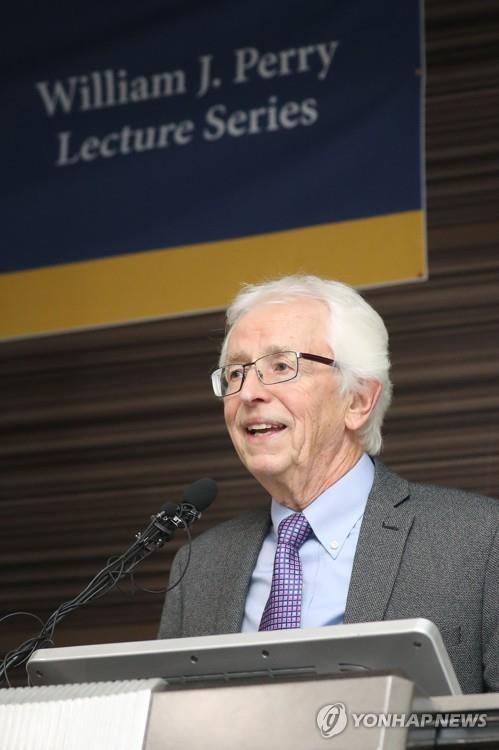- California Assembly OKs highest minimum wage in nation
- S. Korea unveils first graphic cigarette warnings
- US joins with South Korea, Japan in bid to deter North Korea
- LPGA golfer Chun In-gee finally back in action
- S. Korea won’t be top seed in final World Cup qualification round
- US men’s soccer misses 2nd straight Olympics
- US back on track in qualifying with 4-0 win over Guatemala
- High-intensity workout injuries spawn cottage industry
- CDC expands range of Zika mosquitoes into parts of Northeast
- Who knew? ‘The Walking Dead’ is helping families connect
U.S. nuclear expert hails N.K. offer to close Yongbyon nuke complex as ‘remarkable’
SEOUL, Sept. 27 (Yonhap) — Siegfried S. Hecker, a renowned U.S. nuclear scientist, hailed North Korea’s recent conditional offer to shut down its main Yongbyon nuclear complex as “remarkable,” despite skepticism that the closure may do little to contribute to its eventual disarmament.
Hecker, known for his direct experience with Pyongyang’s nuclear program, also stressed the importance of building trust during a nuclear disarmament process, which he said may take a decade or more.
“One of the remarkable things about what President Moon Jae-in came back with is that he said (North Korean leader) Kim Jong-un agreed that he will dismantle the Yongbyon nuclear complex,” Hecker, a senior fellow at the Center of International Security and Cooperation at Stanford University, said during a lecture in Seoul.
“I find that hard to believe because they have several things in there that I know they pride enormously. They may well be willing to shut down the reactor, the five-mega watt, down,” he added.
During his third summit with South Korean President Moon Jae-in in Pyongyang last week, North Korean leader Kim Jong-un agreed to additional measures to signal his willingness to denuclearize.
The measures are dismantling a key missile engine test site and launching pad in Dongchang-ri on the North’s west coast in the presence of international inspectors, and closing the Yongbyon complex if Washington takes “corresponding measures.”
Detractors, however, discounted the offer to close the nuclear complex, saying that the facilities there are already “outdated” or “of little strategic value.”
Hecker’s evaluation of the summit agreement was different from that of the skeptics.
“Yes, (the facilities in the Yongbyon compound) are old, but they are functional … They can be operated. That reactor could still operate,” he said.
“We know that there are other uranium facilities besides Yongbyon, and since we don’t know where they are, that is going to take time … But uranium is not as dangerous as plutonium. Plutonium is more important,” he added.
Hecker also said that the operation of the North’s nuclear facilities has continued.
“They are making more plutonium. The reactor is operating. It stops every now and then because that is the way the reactor operates … For the most part, the operation has continued throughout,” he said.
“The centrifuges … You don’t shut down centrifuges … They go 24/7. Those are still operating. That doesn’t surprise me at all because they haven’t said yet that they would actually shut those down,” he added.
Asked about U.S. National Security Advisor John Bolton’s past mention of the proposal to ship out the North’s nuclear weapons to the Oak Ridge nuclear facility in Tennessee as part of a swift denuclearization process, the scientist balked.
“Even if (the North) would agree, I don’t want their weapons. Do you want to be anywhere close to the plane or ship that’s carrying those bombs when you don’t know how they were designed and how safe they are?” he said.
“That is most dangerous thing in the world to do. Only those people who designed and built the weapons should disassemble the weapons. We have no business disassembling and taking their weapons. We know how to dismantle ours. Russians know how to dismantle theirs. North Koreans know how to dismantle their own,” he added.
In response to a question concerning a flurry of projections on a potential timeline for the North’s denuclearization, Hecker said the most important part is “politics.”
“How do you persuade them to do this? You have to persuade them that it is an unnecessary burden. As long as it is a treasured sword, they are not going to give it up,” he said.
“How long does it take to convince them? I don’t know. If once you can convince them, then to actually get to the point where you demilitarize … My suggestion is to convert from military to civilian (use of nuclear power),” he added.
Hecker has advocated for a 10-year roadmap to “halt, roll back and eliminate” the North’s nuclear program under a “cooperative conversion” program according to which the North would be persuaded to convert their nuclear program to civilian purposes.
He also painted a positive outlook for building trust with the North, particularly in the scientific research field.
“Is it impossible (to build trust)? No. You can imagine that we had (a hostile) U.S.-Soviet relationship. There was no trust. There was animosity,” he said. “Scientists have a much easier time to have trust. The reason for that … If you work with the other scientists, they have the scientific capability, and immediately have respect. And when you have respect, it is easier to develop trust.”












